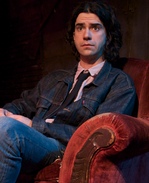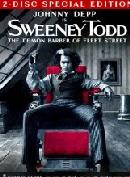SITE GUIDE
SEARCH
ADVERTISING AT CURTAINUP
REVIEWS
FEATURES
NEWS
Etcetera and
Short Term Listings
LISTINGS
Broadway
Off-Broadway
NYC Restaurants
BOOKS and CDs
OTHER PLACES
Berkshires
London
California
New Jersey
Philadelphia
Elsewhere
QUOTES
TKTS
PLAYWRIGHTS' ALBUMS
LETTERS TO EDITOR
FILM
LINKS
MISCELLANEOUS
Free Updates
Masthead
Writing for Us
A CurtainUp Los Angeles Review
Sin, A Cardinal Deposed
| In 2002, a courageous Massachusetts judge ordered Cardinal Bernard Law, Archbishop of Boston, to be deposed on charges of negligence in his supervision of priests alleged to have sexually abused minors. No Catholic prelate of his standing had ever been subjected to such a proceeding— Playwright Michael Murphy.
|
 Hamish Linklater
(Photo: Eric Curtis) |
Given that we don't often get to see people like Bruce Davison, Gary Cole, Richard Kind and Dan Lauria performing live, Sin is a fitting showcase and a quick evening. The no frills format presented by director Paul Mazursky's company, however, does Murphy's work little justice. Talented actors reading legal transcripts can only accomplish so much. Would a carefully assembled collection of O.J. Simpson trial highlights — or pick your favorite— be any less compelling in the right hands?
Sin has built-in nitroglycerine. With no attempt at creating a dramatic arc, Murphy has waded through 11,000 pages of transcript of a historic legal proceeding: the 2002 deposition of Bernard F. Law, Archbishop of Boston, the fourth largest archdiocese in the nation. The subject of said deposition — which was quickly released for public viewing — is no less incendiary: Law's negligence over allegations that priests he supervised had sexually abused minors.
Our players are Law, his attorney William Varley, the plaintiff's attorney Orson Krieger, abuse victim Patrick McSorley and a series of witnesses, male and female, who communicate via correspondence only. For reasons unknown, there is an intermission, brought about when McSorley (played by Hamish Linklater) storms out midway through some of Law's testimony. "We need to take a break," says Krieger. And so they do.
Law (Davison on opening night) presents himself as a righteous man adept at sidestepping or evading uncomfortable questions. Sporting a mass of white hair, Davison's Law — for all his presumed negligence— is largely unflappable, never brought to squirm. Cole, as Krieger, hammers away at him with less than Jimmy Stewart-ish brio. The sparks of a crackling courtroom drama are largely absent in Murphy's work. The emotion, however, is not. Malick and Lauria solidly deliver an assortment of witnesses, many of them blue collar Bostonians who found their trust in their church utterly betrayed. When he finally gets to deliver McSorley's testimony — another ugly incident — Linklater positively nails it.
Sin's New York production, presented in 2004 and starring John Cullum, may well have packed a more potent dramatic wallop, both for being fully staged and for its still fresh proximity to the actual events. (Editor's Note: Evan is right, it did--CU's NY review).The Hayworth production, for all its actors' considerable skills, feels less weighty. The excellent 2005 Showtime movie, Our Fathers, with Christopher Plummer as Law covers the same ground with greater heft.
|
Sin, a Cardinal Deposed By Michael Murphy Directed by Paul Mazursky Cast: Bruce Davison (Cardinal Bernard F. Law), Gary Cole (Orson Krieger), James Handy (William Varley), Hamish Linklater (Patrick McSorley), Wendie Malick (Maryetta Dussourd), Dan Lauria, Paul Ben-Victor, Nicholas Brendon, Carl Bressler, Christian Campbell, John Ciccolini, Frances Fisher, Richard Kind, Jack Maxwell, Tom O''Keefe, Charles Shaughnessy, Joe Spano Stage Manager: Noah Silverstein Running Time: 1 hour, 20 minutes with one intermission Hayworth Theatre, 2509 Wilshire Blvd., L.A. (323) 960-4442, www.thehayworth.com. From Feb. 26 to Apr. 2 Thu. @ 8pm Reviewed by Evan Henerson, based on Feb. 26 performance. |
|
REVIEW FEEDBACK Highlight one of the responses below and click "copy" or"CTRL+C"
Paste the highlighted text into the subject line (CTRL+ V): Feel free to add detailed comments in the body of the email. . .also the names and emails of any friends to whom you'd like us to forward a copy of this review. You can also contact us at Curtainup at Facebook or Curtainup at Twitter |







